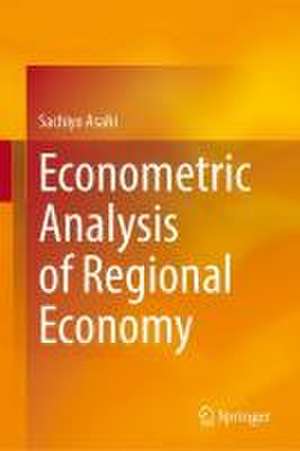Econometric Analysis of Regional Economy
Autor Sachiyo Asahien Limba Engleză Hardback – 28 mar 2024
This book provides readers with an analysis of econometric methods using statistical information to examine actual aspects of Japan's regional economy. Beginning with ways of ascertaining the economy of a region's production factors, the book describes methods for creating new data using various regional statistical data that link regions within prefectures.
The topics addressed here are some of the most pressing issues in Japan's regional economy. These include economic ripple effects due to social capital and public investment, economic evaluation of the environment for sustainable growth, the impacts of overtourism congestion phenomenon, and the measurement of the total fertility rate of female employees in industry.
The book provides a way to comprehend the actual conditions of Japan's regions and the level of regional economic sectoral effects and regional externalities—an analytical method to obtain the information required for policy making. Combining socially related fields on a wide range of issues in Japan’s regional economy, the detailed studies are aimed especially at researchers and policymakers working on econometric analysis research based on economic theory.
Preț: 772.00 lei
Preț vechi: 941.46 lei
-18% Nou
Puncte Express: 1158
Preț estimativ în valută:
147.79€ • 151.99$ • 122.61£
147.79€ • 151.99$ • 122.61£
Carte tipărită la comandă
Livrare economică 18 februarie-04 martie
Preluare comenzi: 021 569.72.76
Specificații
ISBN-13: 9789819987061
ISBN-10: 9819987067
Ilustrații: XIV, 240 p. 51 illus., 45 illus. in color.
Dimensiuni: 155 x 235 mm
Greutate: 0.54 kg
Ediția:2024
Editura: Springer Nature Singapore
Colecția Springer
Locul publicării:Singapore, Singapore
ISBN-10: 9819987067
Ilustrații: XIV, 240 p. 51 illus., 45 illus. in color.
Dimensiuni: 155 x 235 mm
Greutate: 0.54 kg
Ediția:2024
Editura: Springer Nature Singapore
Colecția Springer
Locul publicării:Singapore, Singapore
Cuprins
Chapter 1. Introduction: Significance and Role of Regional Economic Analysis in Japan.- Chapter 2. Study of Total Fertility Rate of Women in Employment, by Industrial Sector: Estimation of Japanese National and Prefectural Data Using the Own-Children Method.- Chapter 3. Analysis of the Impact of Overtourism in Japan: The Effects of Congestion Phenomena.- Chapter 4. Analysis of Environmental and Economic Effectiveness of Wind Power Generation in Japan.- Chapter 5. Economic Ripple Effects of Choice Factors and Disaster-Related Investments at Nagoya Port.- Chapter 6. Summary and Future Tasks.
Textul de pe ultima copertă
This book provides readers with an analysis of econometric methods using statistical information to examine actual aspects of Japan's regional economy. Beginning with ways of ascertaining the economy of a region's production factors, the book describes methods for creating new data using various regional statistical data that link regions within prefectures.
The topics addressed here are some of the most pressing issues in Japan's regional economy. These include economic ripple effects due to social capital and public investment, economic evaluation of the environment for sustainable growth, the impacts of overtourism congestion phenomenon, and the measurement of the total fertility rate of female employees in industry.
The book provides a way to comprehend the actual conditions of Japan's regions and the level of regional economic sectoral effects and regional externalities—an analytical method to obtain the information required for policy making. Combining socially related fields on a wide range of issues in Japan’s regional economy, the detailed studies are aimed especially at researchers and policymakers working on econometric analysis research based on economic theory.
Caracteristici
Analyzes the regional economic effects of environment and tourism using econometric methods Facilitates the understanding of Japan's regional economic sectoral effects and regional externalities Presents new data for regional statistical data, linking regions within the 47 prefectures of Japan
